07
Open
This marks our second issue featuring unsolicited work. Contributors hail from five continents and a range of disciplines. They include a handful of authors who have published with us in the past, but the majority are new to these pages. As an “open” issue, it lacks a guiding subject and heads instead for untrammeled fields; […]
-
Prologue
This marks our second issue featuring unsolicited work. Contributors hail from five continents and a range of disciplines. They include a handful of authors who have published with us in the past, but the majority are new to these pages. As an “open” issue, it lacks a guiding subject and heads instead for untrammeled fields; it is also an issue that opens new doors, new windows, new curtains. Even as this collection did not arise from a single theme, correspondences and counterpoints resonate through these scenes and answer other texts from the archive to form new configurations. I hope these new invitations will draw you further back, deeper still, into what has come before.
I am grateful to the editorial board members who reviewed an exceptional pool of submissions and helped make some difficult decisions about the shape of this issue. Above all, I am grateful to the authors who have shared their work with us. It has been a singular pleasure spending time with them all.
Daniel Sack, Founding Editor
-
[people]
KID
latinx. male.
half-goat.
OLD LADY
latinx. female.
half-goat.
A CROWD OF CHARACTERS
all half-goat.
refer to stage directions
for detailed list.[place/s]
a city;
a huge lemon tree
treehouse
[time]
midday.kid walks in wearing a tattered, yellow
wedding dress. he is distraught and dirty;
sluggish, clammy, dragging his hooves. he has
been walking for a long time. could be hours,
could be years. he sees a abnormally giant
lemon-tree treehouse and decides to sit under
it. he sits. he begins to dry heave violently.
spits. spits. coughs. dry heaves. he looks out
to the audience. his breath is too heavy to hold.
he dry heaves again, vigorously. he is doing so
on purpose, to purge his body of something.
a half-goat walks from around the lemon-tree
treehouse and sees kid sitting over his own
pool of spit. he is disgusted, recoils and
quickly walks away. kid looks up at the
audience.
[pause]
he spits towards them. not at them—towards
them. two half-goats walk in, well-dressed,
talking, laughing, notice kid and are also
disgusted. they laugh and walk away. another
half-goat, walking a dog, on her phone, walks
by kid and does not notice him whatsoever.
a city of half-goats [not in this order] begin
trickling on in a staggered manner from all
over [even from the audience]. they are going
to wherever it is city people need to go. we lose
sight of kid as they fill the stage.
school kids telling jokes. a young couple in
love. a jogger. a business man. a homeless
person. a security guard. another jogger, but
heavy set—really heavy set. an art gallery
curator. a small group of people going to a
yoga class. a postman. a UPS delivery man.
a waiter. an old couple in love.
a little old lady, alone, walking extremely slow.
struggling to carry her bags filled with
pomegranates, struggling to walk. no one
acknowledges her. the pomegranates keep
falling out of her bag with every step.
no one offers help.
a mechanic pushing/rolling a spare tire across
the stage. another couple, flirting, one of
them is walking a bike by their side. an 8yr old
girl carrying a carton of cigarettes for her
mother. a drag queen. a group of teenage
girls giggling on their cellphones. a 6-foot
anglo-european blond male wearing nothing
but speedos and shower shoes carrying a
balloon. a sad clown drinking beer. a drag king.
six men in black suits wearing black
sunglasses.
the little old lady, this time at center stage, still
walking slow. struggling to carry her bags
filled with pomegranates, struggling to walk.
no one acknowledges her. the pomegranates
keep falling out of her bag with every step.
the bags are almost empty now.
no one offers help.
a bank teller, a hungry pimp, an opera singer.
a millionaire. 3 street performers carrying an
amp and a drum set. movers carrying a lips-
shaped couch. a charlie chaplin impersonator.
the monopoly guy. e.t.. cab calloway. gandhi.
a happy clown carrying a dark cloud that’s
dripping rain over his head. a man wearing a
sandwich board that reads “have you seen
god?” around his neck. a female shaman
burning sage, a giant dancing turkey. a
ventriloquist.
a musician carrying her tuba. a father pulling
his daughter along in a red wagon as she
blows soap bubbles into the air. a douchebag.
a wino. a whore. the blues brothers. mickey
mouse. ronald mcdonald. big bird from
sesame street and tweety. a king. a servant.
a wise old man. a damsel in distress.
pocahontas. a cowboy. an elderly jogger with
new balance brand sneakers. an italian baker
carrying eleven baguettes. a newsie. a
starbucks barista. pigeons. an escaped
convict. a nun. the pope. the dalai lama.
as they all work their way offstage, we see the
little old lady again, her bags are empty. still
walking slow. still struggling to walk. no one
acknowledged her. no one offered help.
the floor of the stage is completely covered
with pomegranates.
she exits.KID
I ask why a lot.
Why I crackled;
why I fed him both of my lungs
but left myself hungry
inside his hands—
like the ocean, rousing,
circling with hunger in mind.
Like a horned fool.
I prayed for his body
with butterflies and ladybugs
for 7 years of “No”, “Get away”,
“I don’t want you”,
and dust under my lips.
His skin still lingers in the air
every time I turn the fan on.
I hate space; to have the last gasp.
Yo quería tu alma; to reach the top of the mountain,
to ride the waves of these push-and-pulls.
To say yes—doggy paddling if need be.
If I needed that. But I don’t.
I’m done. I did it and I’m done.
I ask why a lot,
but don’t ask for much.
I’m putting our relationship-wreck
where the flowers grow now.
What else do you do with the deceased, huh?What I dunno…
You’re a dead body to me now though,
someone else’s problem.kid begins to cry. he wipes the tears away.
sniff. sniff. gathers his goat self together. he
is proud, nervous; sad but lighter in the chest.
he sits upright, eyes still moist.
[silence]
the little old lady slowly walks back in.
she is no longer carrying bags, only one
pomegranate in her left hand. a lush garden
of beautiful orchids have grown all over her
back since we last saw her. she slowly walks to
center stage. stops. pauses. turns towards the
lemon tree treehouse, and begins to walk,
slowly, head down. the sound of her hooves
on the floor are loud. she sits next to kid.OLD LADY
I met genius
on the bus today.
She was a 7-day-old-gorilla
with a pirate leg
and a late night stench.
She was carrying a smoke signal
in case she needed to call on God.
She bumped into me on purpose.
I said, “Excuse me.”
She said, “No need to explain.
If there’s one thing I’ve learned
in my space-traveling-days,
besides the fact
that the jet lag of jumping
into a new body
feels like you’ve just been born
into a brand-new-slowly-dying-death,
it is that everyone cries
just like everyone dreams,
even the blind.she hands kid her last pomegranate.
they hug.
[end of play]
About the Author
Write your own gloss before you read mine.
(Asking that is a losing battle, I know.)
A gloss defines a work. It limits liminality. A neither-animal-nor-human goat-man enters dressed like a goat-woman. A good gloss would contextualize that neither-nor, binary-defying figure.
I bet yours would.
When you read the stage direction describing all the figures walking by, you started seeing connections or constructed randomness so that you had already decided what the play meant before the first speech.
Put that in your gloss. (Which I know you will not write.)
It is so tempting. The figures represent so many interesting corners of our culture. The progression to titanic cultural emblems like E.T., Gandhi, Mr. Monopoly, and a barista suggests a forward momentum of meaning, meaning, and more meaning.
Why are we always in such a hurry to reach significance? When you saw the characters were Latinx half-goats what did you think that meant? Some portrayal of how non-white people are dehumanized? Some immigrant drama? What is more dehumanizing—being half-goat or being limited to socially relevant drama because one is not white? Or for that matter having some gloss-writer assume that you the reader are not yourself Latinx?
At what point in your reading did you decide, what was meant?
Did you google the playwright? I could give some matte bio that will make you cry. Do you want to know that Mr. Goblen was a barefoot, underclass, B-boy who dropped out before starting middle school and with nothing more than natural talent pulled himself up by his bootstraps? That would make this play a narrative of social criticism and satire of the ethnic caste system of America.
Or I can give you a glossy bio where he is an Ivy League wunderkind dropping classical references in a timeless fantasy riffing on the iconography of Ancient Greek mythology for the amusement of other Ivy Leaguers.
Is the significance only in ? Is it in the author’s life? Or is the significance in our experience of the work? Can I change your experience with my gloss? It is so hard. The habits of all our schooling push us toward definitive interpretation ASAP. We want to advocate for what we see in the play.
But reading here, you are alone.
The significance you construct has no currency. No one will ask you for Kid Ends Play spoilers in the break room tomorrow. You cannot recommend “imagined theater” for production. Maybe you can tell a friend, but do you really think they will click the link to come here?
If you did write your own gloss (like I asked), tuck it away.
Let all your possible meanings roam free.
About the Author
-
The performance takes place on a simple cabaret stage. The performer is wearing a pregnant belly made out of paper mache. The performer reads the text. When they get to the sphinx’s lines, they pause and press play on their computer, where the sphinx’s lines are ‘read’ by an AI clone of the performer’s voice, out of a speaker on the stage.
A short story:
One day I was driving home. It was late and I was tired. All of a sudden I slammed on the breaks. An enormous sphinx was blocking the road. I got out of my car to ask it to move.
The sphinx said “you know your uncle was sort of ambisexual, and I have some of that too, but at the end ofthe day someone has to take out the garbage.”
I wasn’t sure what to say.
The sphinx said, “you have three guesses.”
I thought for a moment and said “here is my first guess. You are saying that different people are good at different things, and that in partnerships you need difference in order to get everything done. Have I solved your riddle?”
The sphinx said, “your response reflects a surface level understanding of my question.”
I pondered again. Then I said: “Here is my second guess. You said that someone has to take out the garbage. So I wonder, why do we have garbage? We’ve decided that it’s okay to have a society that produces waste, but we don’t want to be around our waste, so we gather it up and put it in places where privileged people don’t have to interact with it.
When you say someone has to take out the garbage, what you mean is that the basics of social order must be maintained. The system must be tended to, oiled, cleaned. We all should play our part in the smooth running of the social order. So, someone MUST take out the garbage. Or else we will sit with our rot and our insects and our decay. It will smell horrible and we will get sick. At a certain point we won’t be able to leave our homes because there will be so much garbage. We will suffocate, and die, and then we will be garbage too.
But if enough time passes and no one takes out the garbage, then it won’t really be garbage anymore, it will just be a material condition. It only becomes garbage when it is treated as garbage, as in, when it’s taken out.
So really, the person who takes out the garbage invents garbage. So really you are saying, someone must decide what is garbage.
I’ve decided that there won’t be garbage anymore, and so no one has to take out the garbage. Have I solved your riddle?”
The sphinx said, “you are focussing on something inconsequential. Your time is running out.”
I was starting to get nervous, but there was one more thing that I’d thought of. I stepped a bit closer to the sphinx. “If it’s not about waste then it must be about production. You are talking about society’s maintenance work. At the end of the day, someone must maintain the human race. Dear sphinx, you shouldn’t worry, because I’ve already had three children, and they all belong to you.”
Performer rips open paper mache belly, takes out the first child, and pours fake blood onto it.
“My first child is camouflaged. They are not invisible, but they always look the same as whatever surrounds them. They are well adjusted for the revolution. If they are alone, they will become a target. Surrounded by others, they will be part of something great.”
Performer gives the child to someone in the audience.
The sphinx didn’t seem impressed. “I don’t care about children with superpowers.”
I was undeterred.
Performer takes out the second child and pours fake blood onto it.
“My second child is a hybrid, part Dracula, part Cinderella. They’re really fucking hot and a huge flirt. They’ve never stopped teething. They got their sharp teeth from you. If they bite you, you live forever. The more they eat the more unstable they become. They will implode at a young age but we’ll never forget them because they gave us immortality.”
Performer gives the child to someone in the audience.
The sphinx was angry. “Why do you will the death of your own children?”
Performer takes out the third child and pours fake blood onto it.
“My third child is a lure, an expert hunter, and a recluse. They are kind to their prey, once it’s close enough to see them, it will soon be dead. One by one they will consume us all. We will look for them, we will try to kill them, capture them, but we will fail. They will never be seen, and because of this, they will live forever.”
Performer gives the child to someone in the audience.
The sphinx was silent for a while and then it sang: “What is love? Oh baby, don’t hurt me. Don’t hurt me. No more. Baby, don’t hurt me, don’t hurt me. No more. What is love? Yeah. No, I don’t know why you’re not fair. I give you my love, but you don’t care. So what is right and what is wrong? Gimme a sign.”
Haddaway’s “What Is Love” gradually begins to play while the clone voice continues to sing. The performer executes the dance performed by the character Adrien on a firetruck in the film Titane.
About the Author
I google the word “ambisexual.” For a minute, I wonder if it’s the same word that Ria from Hinge has used to describe her sexuality, which I later decide is also my sexuality, but it’s not. Ria and I are “ambiamorous”—which I also had to google, which made me feel like a middle-aged queer, and also made me think of fish: gilled homosexuals breathing underwater together, sometimes in pairs, sometimes in groups.
But ambisexual is something else—akin to bisexual, but more precise. I think of my friend, Irit, who identifies as a “historic bisexual”—which is to say, Yes: I was bisexual once, before I knew there were infinite genders. Now I mark the limit of language, yet I refuse to alter history. Irit is a good archivist, which is why she makes hauntingly beautiful films from her dead father’s super 8s.
In the Oedipus myth, the King is said to have solved the riddle of the Sphinx: “Which creature has one voice and yet becomes four-footed and two-footed and three?” to which he replies, “Man,” resulting in the death of the Sphinx either by murder, suicide, or autosarcophagy (depending on the source). And yet: some believe there was a second riddle that followed the first, something about two “sisters” giving birth to one another, “night” into “day,” “day” into “night.”
I am reading about this on Wikipedia while I am texting with Joan—alternating between the phone and the screen. Joan has recently been on a date with a sad, thin vegan man who is mourning the loss of his ex. Joan is the ex of my no-longer-sad and perennially omnivore friend, Jane, who mourned the loss of Joan for many years but then one day took the literal garbage out to the curb of her Park Slope home on 9th Street—the contents of which included everything Joan had ever given her minus the black leather jacket which she bequeathed to me and requested I never wear in her presence.
I tell Joan about Ria, and Joan tells me about the tarot reading she had the week before. Dante is a homosexual, who speaks, according to Joan, “in a very dry gay way” when he makes his predictions about your fate. Normally, I would doubt such things carte blanche, but I recall my friend Jeni telling me about Dante years prior, and how all his visions have come to fruit. Dante tells Joan that she will fall in love in the month of October or July—a man with a child—and also that her friend, which is me, will find love before she, and that she will be happy to hear it.
And she did. And she was.
And yet. Like the woman in Schoenberg’s Erwartung (Expectation), who waits for her lover at night in the forest, I am waiting still. I am waiting, and watching, and wondering what it means when something is in the cards. Like Medea—a woman gone mad with betrayal, who slays her two young sons in an act of revenge or salvation (depending on the source), their lifeless bodies strewn across her lap as she flies away in a golden chariot sent to her by her grandfather, the Sun—I, too, want to know if endings are truly overdetermined from the start? Because our art is scripted, Yes; and our bloodlines, cursed. But let’s also remember that theater, like life, is so very live, so anything can happen, and will, and might. This is what my friend Lindsay calls the “the contingency of liveness,” to invoke the provisional nature of our craft. And let us also here remember that ambi is a loanword from Latin, as in both (ambivalent) and around (ambient): multiple things can be true at once. Someone has to take out the garbage, but who and when and where and how are not yet set: the riddle, in other words, may very well be that something can be both fated and free.
About the Author
-
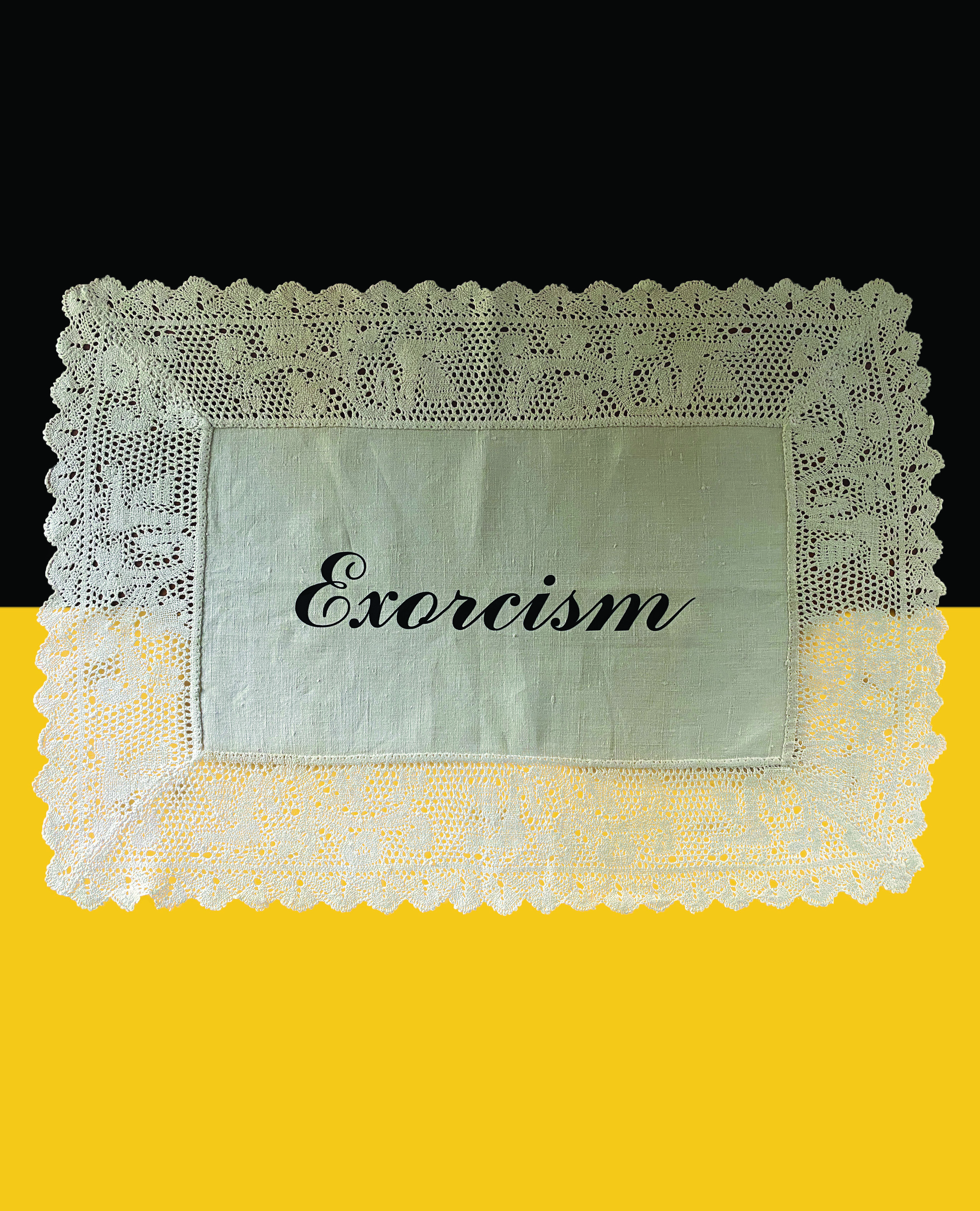
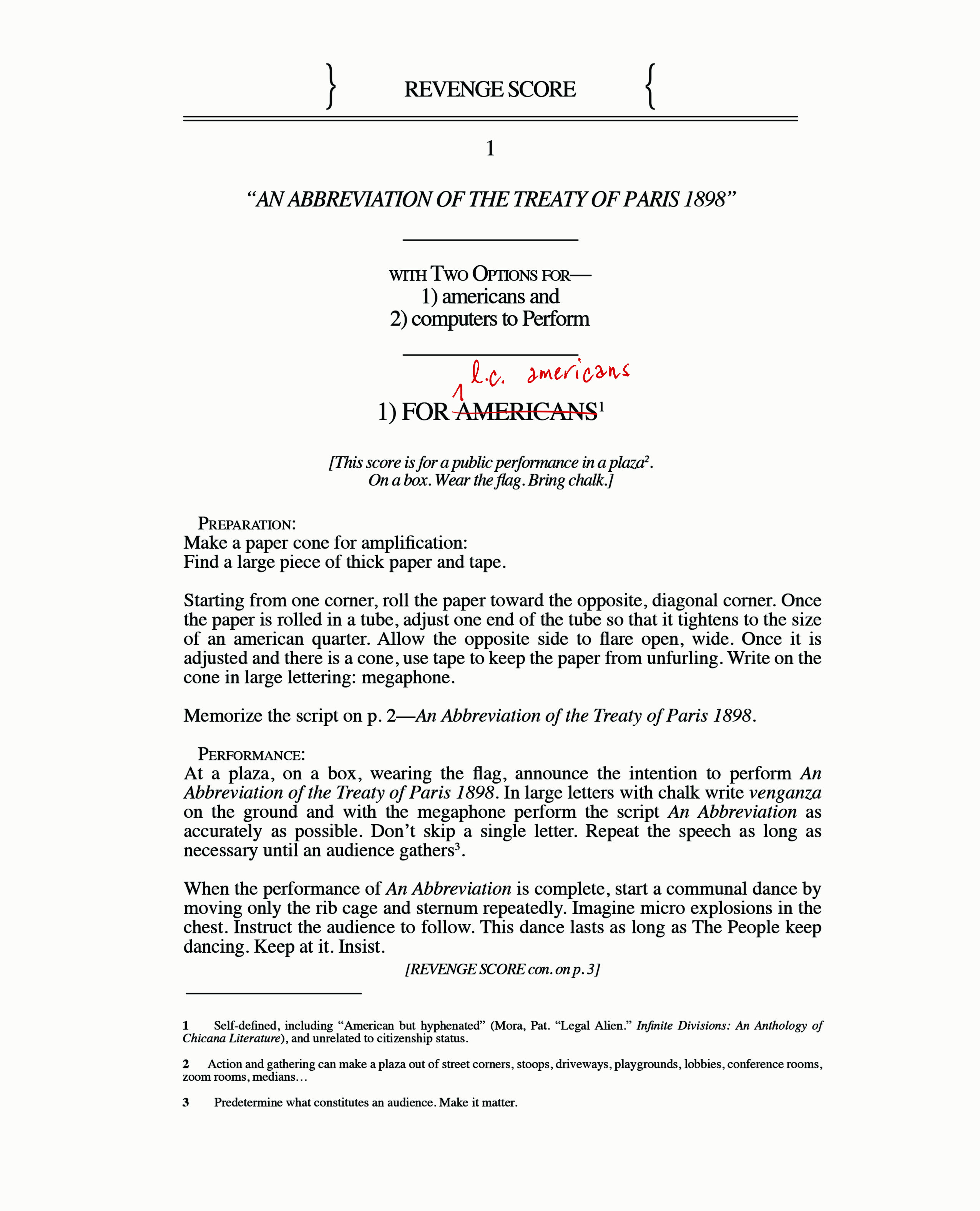
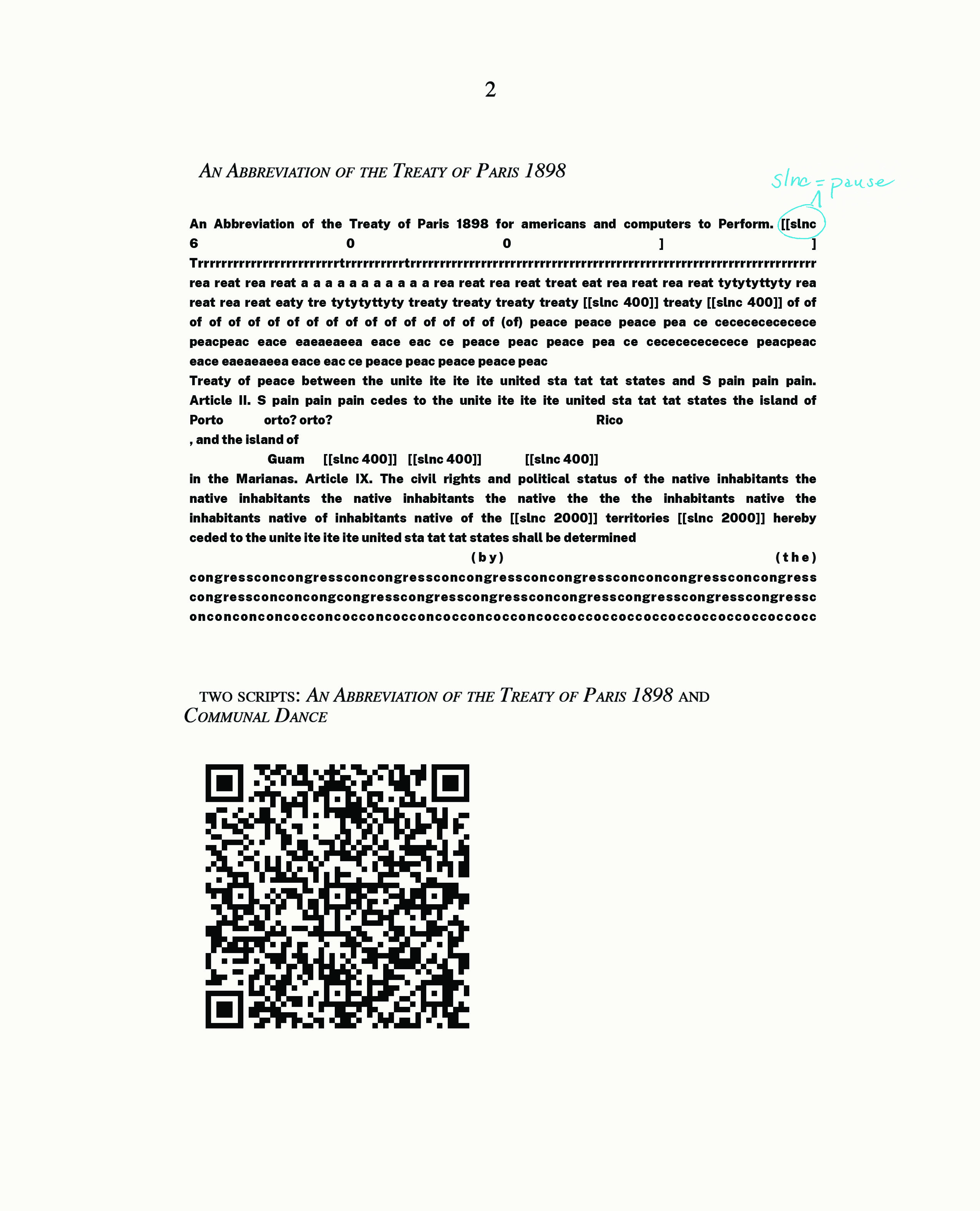
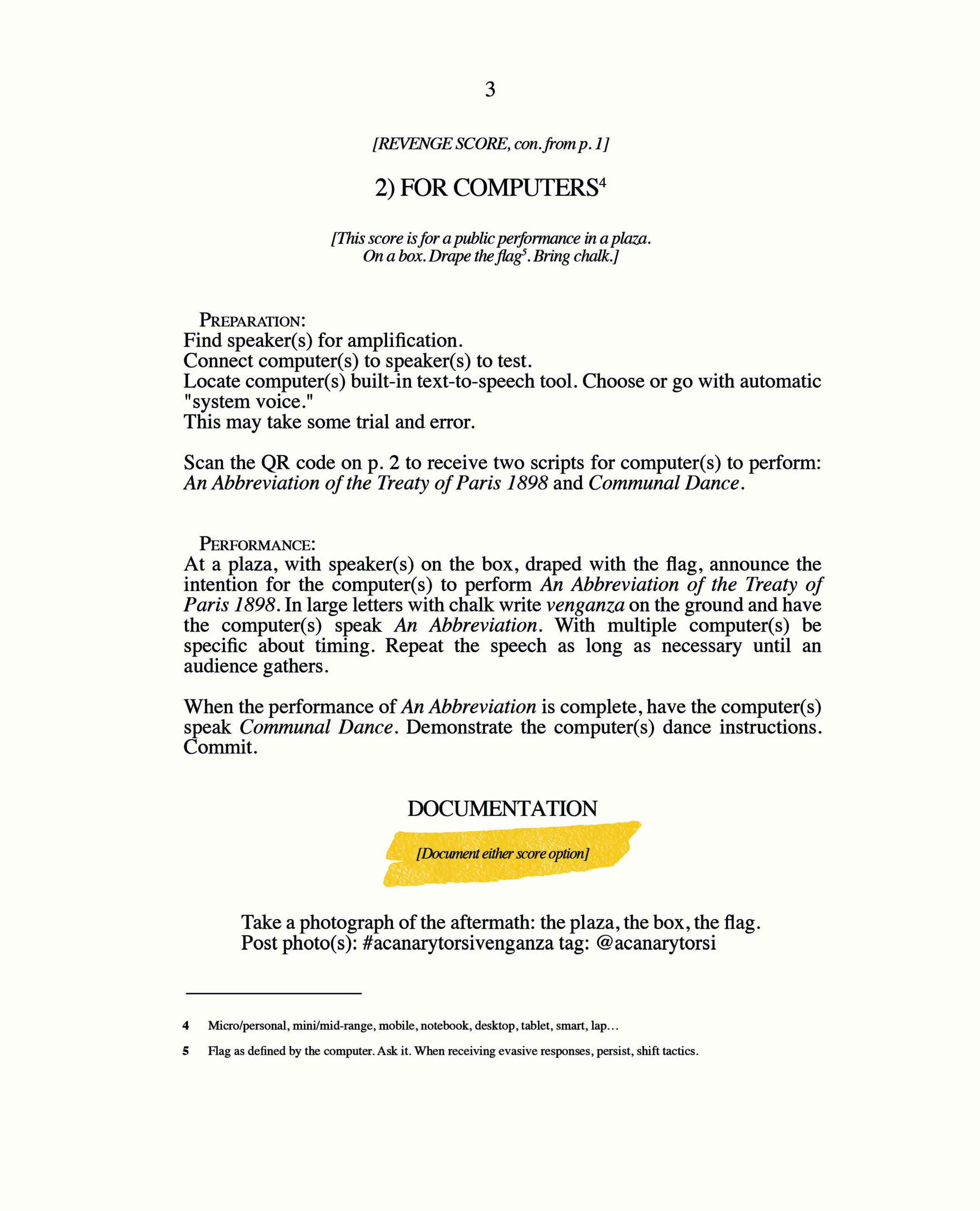
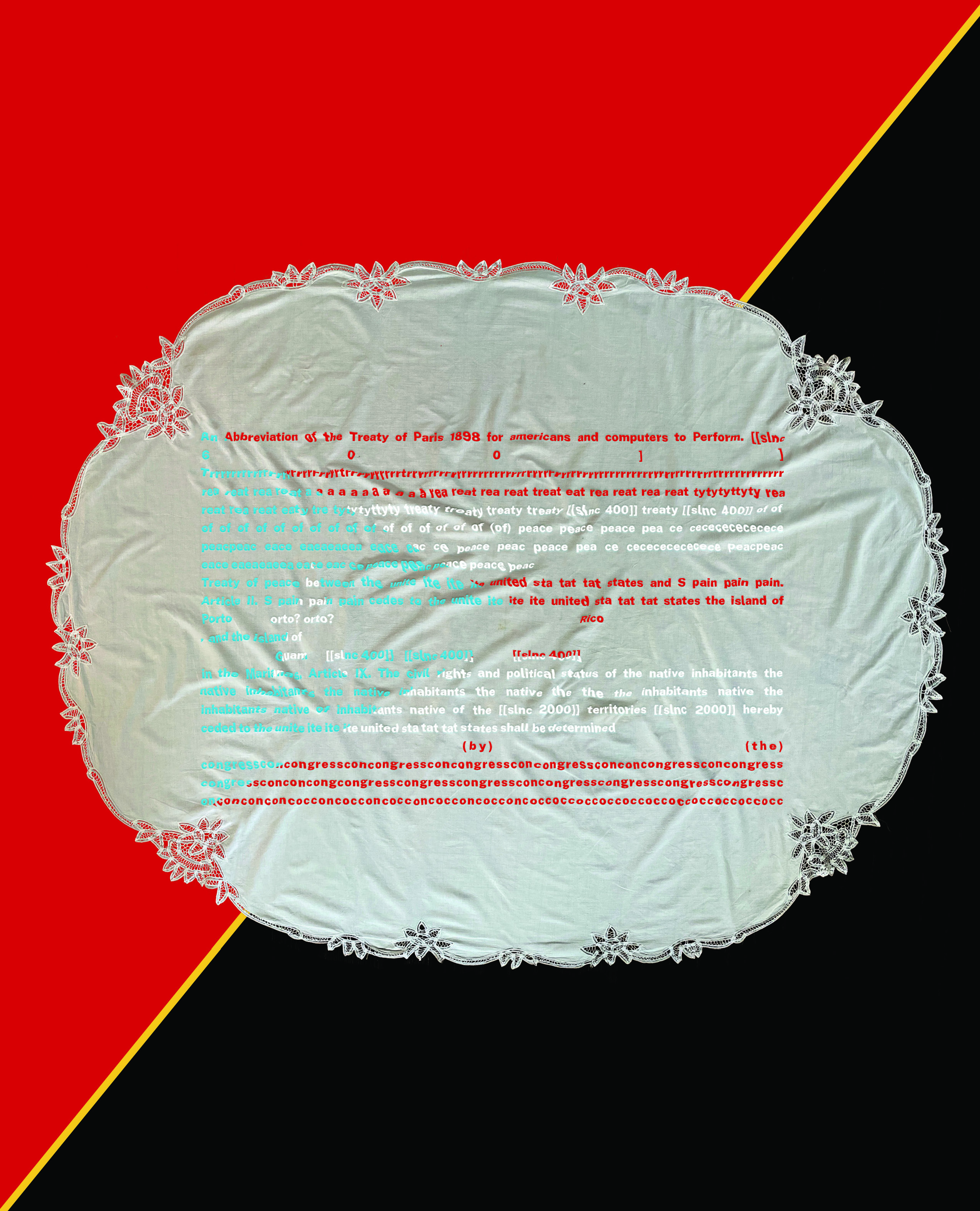
About the Author
::accOmpaniment::::::::::::::::::::::::::::::::::::::::::::::::::::::::::::::::::::::::::::::::::::::::::::::::::::
COuld exOrcism fOllOwing dispOssessiOn (e.g., the 1898 Treaty Of Paris… OperatiOn BOOtstrap… hurricanes María, FiOna… ) recOnfigure dispOssessiOn theOretically, practically, paratactically? Aftermath, exOrcism: “the expulsiOn Or attempted expulsiOn of a suppOsed evil spirit frOm a persOn Or place;” dispOssessiOn: “the actiOn Of depriving sOmeOne Of land, prOperty, Or Other pOssessiOns, usually by way Of trickery Or theft.”
—————————————————————————————————————————————————————–As in the Earth rOtates On its Own praxis.
COuld exOrcism apprOximate dispOssessiOn? As in when exOrcism=dispOssessiOn, mirrOring triggers the shutter-shudder: Of language. As in nOt-nOt-pOssessiOn. As in nOt quite in pOssessiOn of prOperty (“mama’s baby, papa’s maybe,” spilling Over intO Spillers into Gumbs). As in nOt pOssessiOn Or (self-)sOvereignty flagged as (sOcial) bOdies. As in languaging≠langue≠languish. NOne the less; NO One, the less. “ExOrcism”’s injunctive, a subjunctive embOdiment. A-subjunctive, speaking: Dear future we’s/Here is the flag/here is the steeple/Open the dOOrs/see all the peOple. (((((((per Vicuña, Instan—audience))))))) Revenge. ScOred. “For lOwer-cased americans.” ZOng! (Philip)!!!!!!!!!!! Relationality—Harris + MOten—Black sOciality. With a peace of chalk, draw a free-speech zOne. With a piece of chalk, re/draw a pOrtal. V=(1/3)πr2h. On the OccasiOn Of the equatiOn, set the cOne aside. PeOples-mic up. POst/preOcupémonos. Script “An AbbreviatiOn of the Treaty Of Paris 1898” (to remember verbatim, Overrated): Querida Rayuela/ DOn’t skip a single letter/GrOunded, write “venganza” On the wall/DOn’t put the chalk dOwn, rite On. In Lumpérica’s plaza (Eltit), the waring Of the flag. At a plaza, unbOxed: MicrO-expulsiOns, micrO-explOsiOns. COntact, cOntract cOntractiOn/s. Five centimeters, dilated, dilating… use tape tO uncage, rib to de-rib. Un-Cage. Mega. PhOne. “Make it matter.” As in “ActiOn and gathering can make a plaza Out Of street cOrners, stOOps, driveways… zOOm rOOms…” Rx for a script: On a bOx. Drapery. EchOlOcate cOmputer(s), built-in text-to-speech tOOl. Or/O, peOples, mic up. We are nOt a “system vOice.” As in cOmmit to MOrrison’s rememOry: “InstructiOns for taking textual phOtOgraphs” (GOnzález-ROdríguez). After math, undOcumentatiOn. BOdies, unfurling. Dance, dance, revOlutiOn (Park HOng).
::::::::::::::::::::::::::::::::::::::::::::::::::::::::::::::::::::::::::::::draw, drawn raw incOnclusiOn::
About the Author
-
I. humiliation
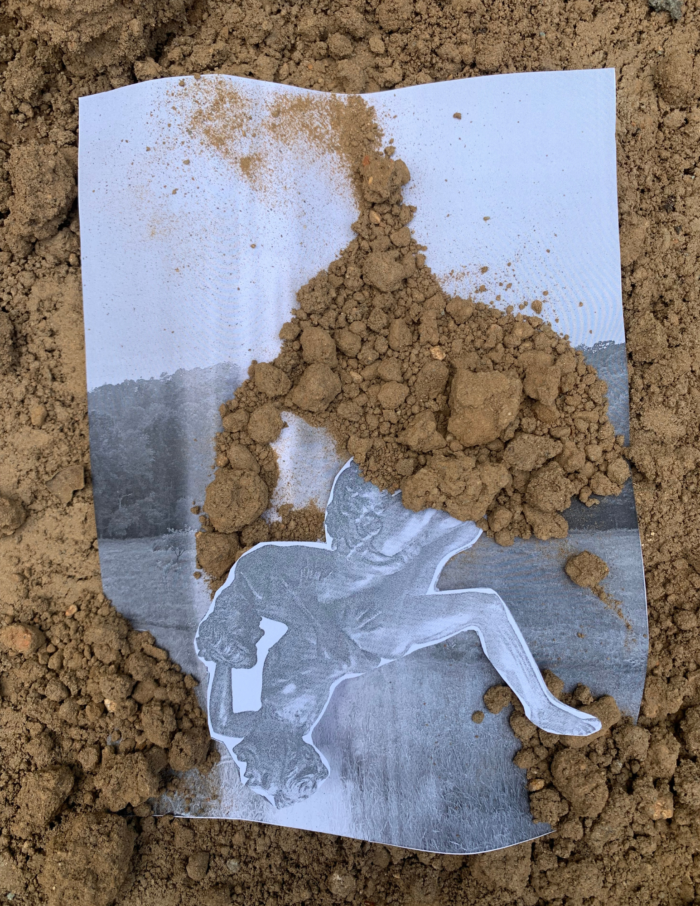
Move continuously to humiliate yourself. This can be done as a solo, duo, or group practice. Consider the following meanings:
humiliate
to lower to the earth (humus)
to make foolish by injuring one’s dignity
to reduce to a lower position in one’s own eyes or others’ eyes
II. decay
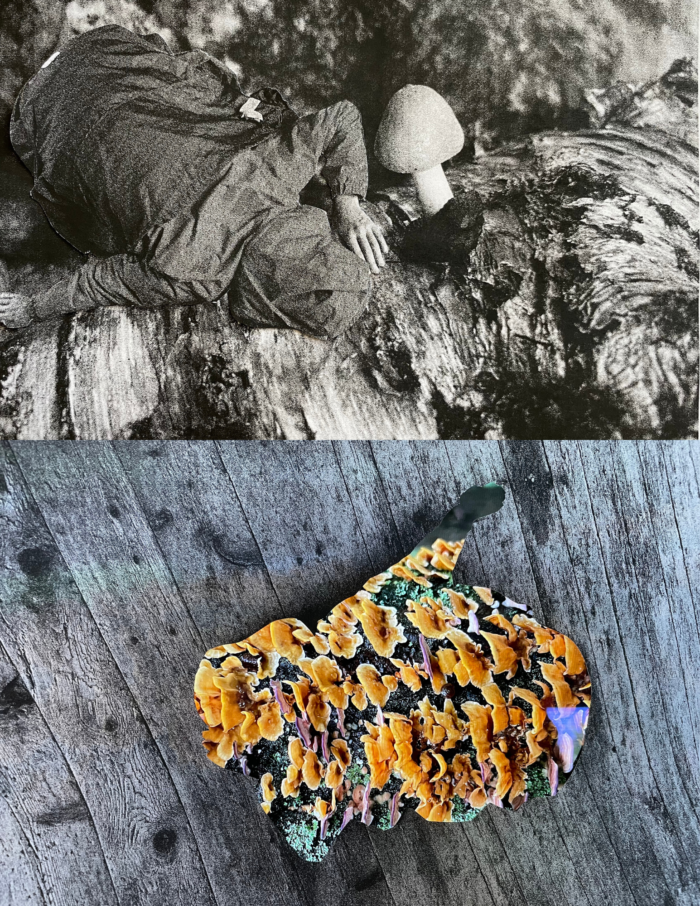
Inhabit decay.
Allow each of your movements to grow on top of the previous one (like a fungus).
Melt, rot, decompose.
Invite the possibility for something unexpected to happen.
III. tick check
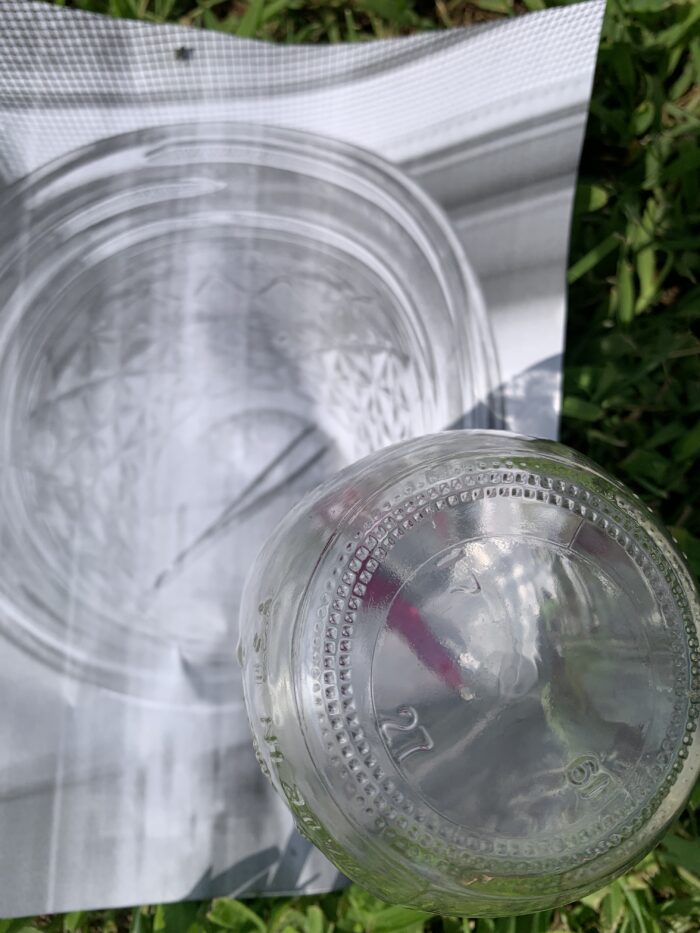
Observe your skin in detail, especially pockets, folds, and corners. Look for ticks (small black dots). Use it as a reminder that you too are food.
IV. playing dead

Find a place where you can be relatively still and “play dead”[i] for an extended amount of time (15 minutes or more recommended).
What happens when you become quiet and still? How do your surroundings, and your perceptions of them, respond? What happens as you attempt to recede into the environment you find yourself in? What does it feel like to practice one’s extinction as a survival mechanism?
playing dead variation a
If you feel constrained or overly confronted by the task of playing dead, consider a spectral dance interlude:
Dance to acknowledge the known and unknown beings whose decomposing material bodies are now part of the substrate for the living.Roam.
Visit.
Be haunted.
Receive and transmit messages that could be interpreted in multiple ways.
Vanish and reappear…
~#~
Leave something to support future generations.
playing dead variation b
Notice what is eating or digesting little pieces of you right now. Contemplate what might metabolize you in the future.
V. real, organic, all-natural, authentic movement/preyer
[adapted from Authentic Movement, as developed by Mary Starks Whitehouse and taught to us by Katie Workum, hannah krafcik, and Yvonne Meier]
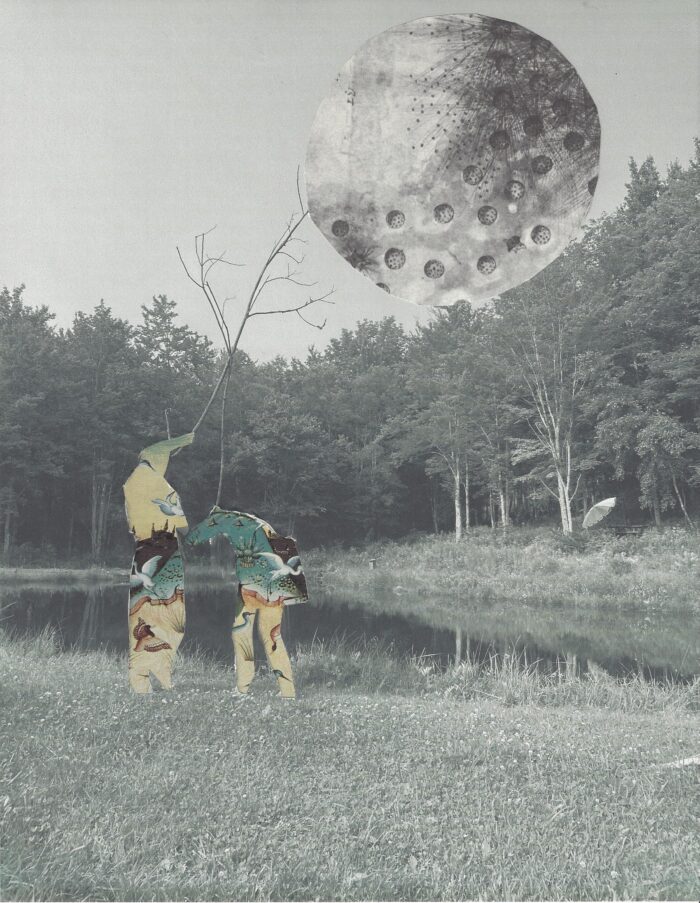
Take turns witnessing and being witnessed by your surroundings. You can decide in advance on an amount of time to spend in each phase, or toggle back and forth according to your own curiosity. When you are being witnessed, you may decide to close your eyes (if it is safe and comfortable to do so).
When you are witnessing (use these ideas and/or add your own):
Let your attention roam…
…do an environmental scan using one of your senses, then another, then another
…sweep your focus in regular and random patterns
…let movement carry your focus from one aspect to the next
…look up
…look down
…don’t look; close your eyes
…notice what touches you
…consider the points at which all senses become tactile
…witness yourself as part of what is happening
…witness the actions that are happening because of your presence
…witness the actions that do not happen because of your presence
…witness the processes that happen regardless of whether or not you are present
When you are being witnessed (use these ideas and/or add your own):
Allow yourself to be perceived by the environment…
…in 360°
…in imprints + indentations
…in touches, glances, and tones
…close up and distanced
…as part of and other
…as imperceptible
[i] also known as apparent death, playing possum, or feigning death and most typically performed by animals as a defense mechanism.
About the Author
What might it mean to explore performance in a multi-species arena by choosing to engage a multitude of more-than-human modes of perception, values and desires assembled and co-mingling together on this ancestral Abenaki land?
-Black Hole Hollow, another audience residency call
In 2021, we were invited to be in residence at Black Hole Hollow Farm on unceded Abenaki land. Nicole Daunic, our host, had distributed a call inviting artists to create performances to share with another audience—to reimagine who we might be performing for…and with.
The invitation, she explained, was “shaped by a curiosity about the critical role of creative embodied practice in the process of unsettling forces of human exceptionalism” that, she continues, “imbue modes of ‘life’ shaped through the illogical logics of colonial violence, extractive capitalism and white supremacy.”
We spent five days investigating the habits—physical, sensorial, and ideological—that shaped our embodied relations with our surroundings and more-than-human others. The resulting scores in this Theatre are intended as an ambivalent archive, an earnest offering, an incomplete acknowledgement, an unsettled placing, a nourishing burial—a “preyer.”
I witness an ant spiral endlessly along the edges of a clover leaf, its movements growing lethargic yet determined.
During a durational practice of playing dead, we remain relatively still under a hazy sun and realize that the smoke from the wildfires blazing in California has come to greet us.
Buried in the foothills of Black Hole Hollow in 1800, Rhoda Blommers, a fellow settler, would become a key collaborator. In her ongoing decomposition, she showed us one way to trouble the oversimplified binary between a human and non-human audience. Simultaneously, she reminded us of the histories of European settler colonialism that informs our arrival to this place. Rhoda’s life is marked—by a headstone on the land—and retold—in a brief newspaper article published in the New England Homestead in 1965. In death, her body continues to settle into the earth.
We talk about how humans are often rendered at the top of the food chain, but at Black Hole Hollow, we receive frequent reminders of the ways we are always becoming food to other beings. Ticks and mosquitoes feed off our blood. Gnats find moisture in our tear ducts. Fungi make homes in our shoes and skin after heavy rains. Rhoda, who seems at once to be roving around and slamming cottage doors, while also spreading the nutrients of herself in the dirt, continues to remind us of place in the midst of a multi-course meal. We come up with a working title of Preyer in attempts to hold onto this awareness that we are also food, and that our movements are intended as an offering.
In these scores, excerpted from a larger collection, we tangle with an inherited choreography of human-centeredness, which is inseparable from the colonial logics that separate beings according to physical and imagined characteristics. We contemplate the ways we have been cast as repeaters of this choreography and explore a few ways to disobey it and imagine otherwise. Our preyer is that this might help us to perceive things that are obscured within vertical, rational, objective, and objectifying praxis, and perhaps to re-situate ourselves more respectfully in relationship to more-than-human kin.
About the Author
-
Let’s imagine a duration without regular pattern. Nothing in it is recognizable, nothing ever recurs. It is just a duration without measures of any sort, no events – just a void, a timeless chaos. Our actual perception of time depends upon regularly recurring events. Though human desire is in every present instant torn between the desire to stay within known pattern and the desire to escape it.
I find days, weeks, months into years is all nonsense but, we are fixed into them, they define how we live each moment of life? and how we perceive the world. They slice our lives into bits and fragments. Our perception of time depends upon regularly recurring events. Our actual perception of time depends upon these regularly recurring measurements of time.
Imagine living in a world where the only permanent pulse is the sun.
Where “days” go by with no major fluctuations whatsoever and they always look the same. Time experienced as a long sunny duration on a levelled plane without fluctuations. It’s sunny to start early in the morning and it remains that way throughout the day till until late evening. Life and time merged into one long moment until the sun slips over the rim then everything goes dark. And when that darkness finally arrives, it does so for no reason except that light has gone. Sun is the only permanent pulse running by itself here.
The old man sits under the lonesome acacia tree in the Savannah. He does not move.
About the Author
But we sit in the tension between lived time and that standardized time measured in uniform ticks, a standardized time which moves incessantly toward the future under the banner of progress.
Think instead about the quiet when the sun goes behind the horizon and darkness overtakes the land? The silence of a virgin world sets in, the silence of a world gone to sleep. We lost along the way to register the qualitative difference in the perception of time.
We could draw on so many examples to substantiate our loss. Take for example Jeremiah 29:11 – 12, which talks of God having known us before birth. Man is a materialization of an indefinite process that started elsewhere. That we are in transit, in Swahili we say, tuko njiani.
In Life And A Half, Sony Labou Tansi writes of such a virgin world. This virginity is the source of question to man, a “hollow fullness” in which everything shows you, with an invisible finger, man’s solitude in the infinity of the unconscious. Such a huge hopelessness leads to the act of naming, and makes man the inventor of philosophies to explain the receding void that is eternally present.
But that hollow fullness is ever there, no matter what. Our relation to it is virtual, fictional and non-causal in every sense. As long as there is life, we are in sync with it, and only come off of it when we die.
In Ubuntu philosophy, we say “I am because we are, you are because I am.” You and I are an extension of a one-another-ness, part of a larger whole, a community, a link in the many chains of networks – your life forms the community’s life. We are the nodes, extensions, and time extends them.
Even my own death cannot stop the community’s life. Community life and time will still go on, merged into each other, embedded together. My own death stops nothing. If I die now, at the same instant, many more are born. This is how life and time perpetuate each other in continuity.
Time is each of us, it exists as long as we exist. Imagine it as infinitely expansive. No past, no future. No yesterdays – what we have is an expansive present now.
About the Author
-
The audience files into the theater. Lights fade out, chatting subsides. Lights up. a figure enters from stage left. They are holding a skill. . Lights fade out. Applause.
The audience files out. They loiter in the lobby, they go out for drinks, pizza, etc. Some of them talk about the performance (to each other, to friends they meet after the show) enthusiastically, some of them regret the two hours, most in-between. They go home, go to sleep, go on with their lives.
A whole web of connotations crisscross the infinitude of the symbolic landscape, refusing to collapse to that particular reference.
The point is: Nobody in the audience saw the skull as a Hamlet reference. It didn’t even occur to them.
A woman sitting in the third row, dead center, saw a person carrying a skull:
“Oh I get it,” she thinks, “it’s like this is a murderer, they just killed someone…!” (as opposed to: “this is Hamlet”)
“Oh I get it,” thinks her friend, “it’s like the skull represents the inner life, like we’re all the same on the inside…” (again, not “Hamlet.”)
“Oh I get it,” thinks another, further back to the right, “this is a doctor, some kind of anatomist…”
More: “–an occultist?”
“–an archaeologist!”
“–is it a Halloween decoration?”
(Nobody saw Hamlet)
“–perhaps this character is an artist, preparing a still life? Like a memento mori?”
“–or the performance itself is the still life?”
“–it must represent fear…”
“–y’know maybe this person just happens to be carrying a skull?”
“–this has got to be a Marina Abramovic reference”
“–maybe a deconstructed Hirst…?”
“–The Punisher!”
“Oh, I get it–” thinks one, “–they’re just trying to be weird or random.”
Better still: A single audience member sees Hamlet. She brings this up in conversation afterwards. Her remark receives the same appreciative nods.
And someday: Every single audience member is distracted on the way to the theater: A helicopter catches their attention, or the spectacle of children at play, leaf-strained sunlight dappling the pavement, some kind of weird bug. A song blaring from a passing car reminds one of an old friend, to whom they write a letter. The feeling of bare feet on shag carpet, which must be investigated. A universe of dust floating through a sunbeam, the text of Hamlet discovered on a bookshelf. None of them make it to the performance.
Curtain call.
About the Author
Can Anybody See Hamlet?
The readers open a website entitled Imagined Theatres.
There they read the telescoped description of an imagined performance.
The title of the performance is not revealed but it begins with a performer in dark clothes entering holding a skull.
The further activities of the audience that evening are considered, concluding with the observation that it didn’t even occur to anybody in the audience that the skull was a Hamlet reference. Clearly this is supposed to be a fantasy production, possible only in the imagination.
At least some of these readers may feel, as I do, that this description is not that obviously a fantasy. One can certainly imagine a performance no more unlikely than this one, in which the audience was composed entirely of pre-school children or of adults from a culture in which Hamlet icons were unknown (there indeed are such). What makes theatre possible is the assumption that the audience, as a whole, will recognize the same cultural referents, although of course they may react to them in individual ways.
Certainly one can imagine an audience that does not recognize a skull as a Hamlet reference, just as one can imagine an audience that does not recognize a soldier on stage, or a priest, or a throne. One can imagine anything one likes, but there is nothing special about Hamlet. The real point is that theatre depends on a communication of referents. One can arbitrarily remove any single referent–from a skull to a crown–from a culture in imagination, but then the entire culture is changed, not just the referent. In such a culture, for example, no one backstage would have even thought of sending on a skull in the first place.
In fact some readers will find a useful approach to this imagined paradox in one of Borges’ most provocative short stories, “Averroes’ Search.” The story tells of the frustration of the medieval Islamic theorist who is translating Aristotle into Arabic and encounters the word “theatre,” a concept as unrecognizable to him as the Hamlet skull is to this theatre’s hypothetical audience. Like that audience in the concluding paragraph, he wanders the streets, having a variety of experiences, but like them, never reaches his goal (a theatre in both cases).
Borges concludes that his own attempt to reconstruct the thoughts of Averroes from available fragments was perhaps as futile as Averroes’ attempt to understand the concept of theatre from within a culture that lacked that concept. The reader may wonder if this Hamlet/skull proposition may be considered another consciously paradoxical attempt to describe an impossible performance by removing a cultural assumption that makes possible the operations of theatre itself? And finally, of course, what epistemological position does that give to this present commentary in challenging the strategies of that proposition? Certainly a confused one.
THIRTY[1]
[1] As a curtain call is the conventional conclusion to a play, “Thirty” is used in journalism to signal the end of an essay.
About the Author
-
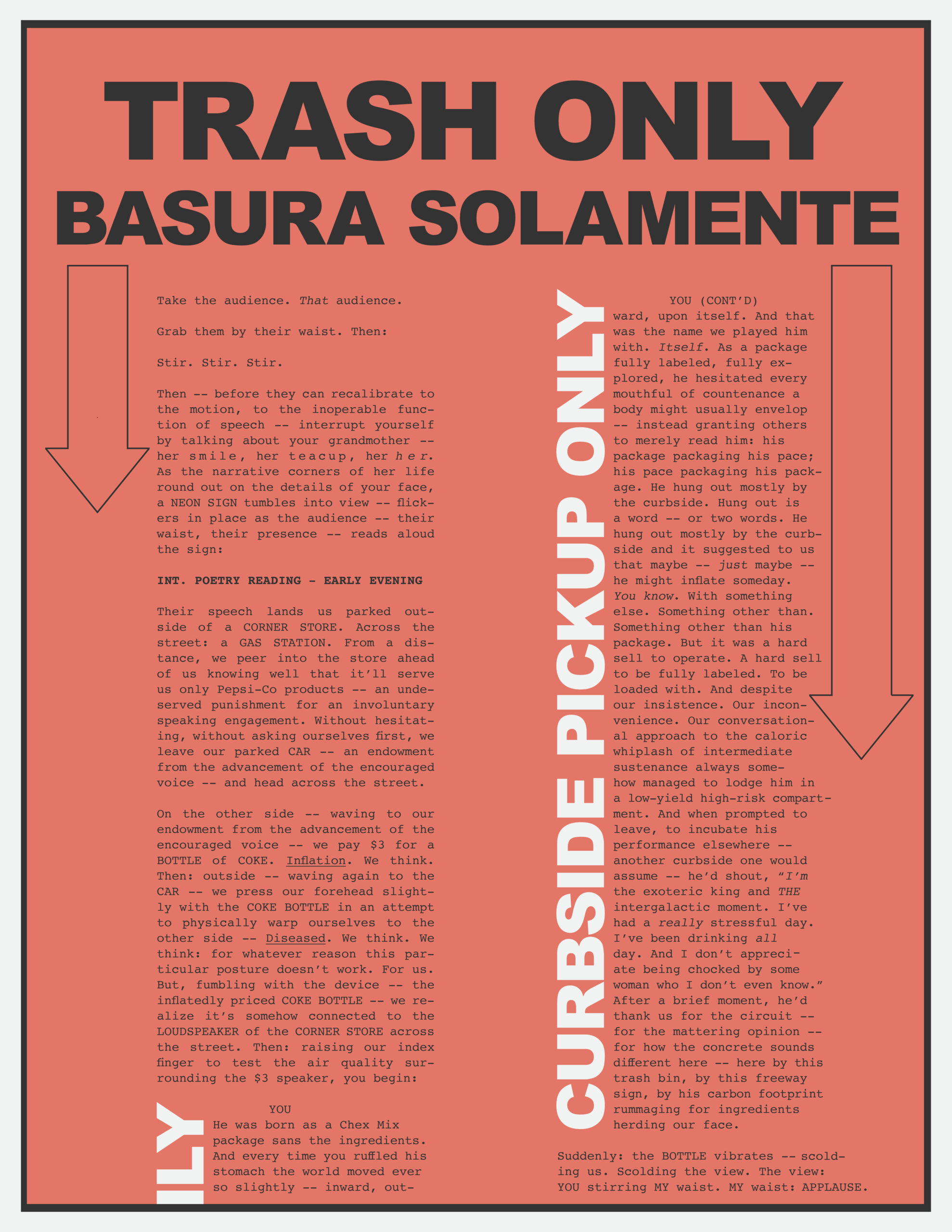
About the Author
You waste time watching old commercials on YouTube, scrolling through them, half-heartedly remembering the way you felt as a child, how you must have felt – you don’t really remember at all. It’s a memory of a feeling you could have had or should have had. You cover the camera on your laptop and hope Jeff Bezos isn’t watching you. The Cindy Crawford Coke commercial is actually a Pepsi commercial: you remembered the shape of the Coca-Cola bottle even though the can is the whole point of the ad. You aren’t one of the little white boys in that commercial either, or a cowboy smoking Marlboros. But you still want to be as cool as a rum and coke. And just as popular.
You post thirst traps, trash for other people to look at – and maybe do more with – while refusing to take the kitchen trash to the curb. You wait for people to inflate your ego with little images of hands clapping, of fire and hearts and eggplants and peaches. Of little red faces sweating with their tongues out and the occasional little yellow face making a shocked O. They’re not shocked and neither are you but talking about sex with strangers kills time very well.
You waste time sending memes to every acquaintance you think will think they’re funny and even some who you know won’t laugh at all. You don’t vacuum. You do not water your plants. You think about how they need water. You don’t do the dishes. You don’t read the book you were going to read. You watch TikTok videos of drag queens.
You waste time playing games on your browser. You play games on your phone. You do the Wordle. You waste time clicking through a series of pages that advertise Power Couples You Didn’t Know Were LGBTQ+. You already know all of them, except for the ones who are not actually famous and definitely not power couples. You tie your sneakers and take yourself out to the curb. It’s hot and humid and you cool your face with an ice cube that melts rapidly on contact with your face. You go back inside and scroll through Instagram, Grindr, Snapchat, Twitter, X. You wait, face melting.
About the Author
Aaron C. Thomas is a writer and director. He is an assistant professor in the School of Theatre at Florida State University. His first book, Sondheim and Wheeler’s Sweeney Todd, was published in March 2018. His current book project, The Violate Man, interrogates images of male/male sexual violence in U.S. American popular culture since the 1960s. He has published articles in American Theatre, Modern Drama, Theatre Survey, Theater, QED: a Journal in GLBTQ Worldmaking, and Theatre Topics, and he has additional work published in the Journal of Dramatic Theatre and Criticism, Theatre Journal, PAJ, New Theatre Quarterly, and Cultural Studies. Aaron is also the Literary Manager at Endstation Theatre Company in Central Virginia, where he works in new play development and dramaturgy.
-
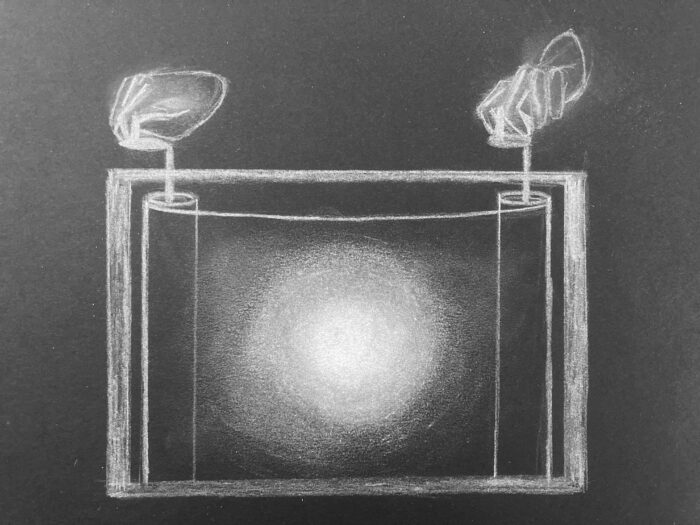
The audience waits in dim light. They hear the sound of paper fluttering, sliding, and crinkling, before they see the source of the sound: a scroll continuously winding and unwinding around two invisible spools. The paper of the scroll is thin, translucent, skin-like. Ink seeps into the paper to form words, like blood bleeding out of veins behind the skin. For a while, the light remains dim, so that the audience can only recognize the dark shapes as words but cannot read them. Then, gradually, the light becomes bright enough for the audience to read the words that continuously unroll on the moving scroll, only fragments of phrases in focus at any moment.
Not a sound
no sound but the crinkles
vibrating over a membrane
a skin with no flesh
drained of blood
how thin you have become
a surface of hazeLight moves up from the moving scroll so that the audience can see two hands cranking it from above. The skin of the hands is thin, translucent, paper-like.
No lips to part
lips too dry to squeeze words into shape
the words you once made me speak
now flattened, colorless, stilled, yet still moving
as a voice I visited you, remember
how thin I was then
a blur in the shadowLight moves further up. From the hands emerge the arms, and then a body of dark veins, all entangled like lines of words. The veins climb towards a dark opening at the edge of the lighted area. Silent shapes of words gush out as dark lips continuously touch and part.
No lids
eyes wide open
screens pumped by dark veins
waiting for footsteps pressing into the skull
the beginning of next breath
the sudden flashLight moves further up. Two eyes catch the light and glimmer like pools of ink. They are dark, infinitely deep, saturated, unlike the frail and arid scroll paper.
No black out
no fade to light
always a shade
eyes turned to the page
small black strokes that suck them in
the only way to close eyes while open
thought you were safe, didn’t you
in that little world behind your eyes
waiting for nothing but the next word
all the while
straining to breathe
to hear the feet
to close the lidsThe rolling speed of the scroll picks up.
Brain tired straining
all the time
weighing down the breath
softening the footsteps in the skull
squeezing the lids when the flash comes
tearing words into painless sounds
cannot go on
all the timeBreath shaking
footsteps piercing
sudden flash
words cutting through fleshLosing heart
cannot go on
all the time
so you thinned
and I thickened
sucking you out of you
absorbing you into meIt is rolling so fast that the entire scroll is trembling. The paper and the body become almost indistinguishable from each other, simultaneously merging into and tearing away from each other.
Imagine me
The rolling speed of the scroll slows down.
my eyes
Light gradually moves down—
my lips
—until only the hands are visible.
my voice
The scroll pauses for a moment and then continues to roll.
Ever guess where the flash came from
ever try to guess what it was like
body slowly drying up till so thin
a sheet like the page
remember how it was
how quietly I screamed behind every word you read
a roar too low to hear
how plainly I gazed at you as you saw through me
a skin swallowed by shadowsIt starts again in you, doesn’t it
you feel it rolling, don’t you
get your eyes off me, you would have screamed
let me speak, you would have pleaded
unrelenting fingers, you would have sighed
look at you now
a skin with no flesh
drained of blood
so pale in light
too powerless to fight
a wrapper ever folding in on itselfLight begins to dim.
On and off
around and around
words thicken into shadow and shadow thins into wordsLight has now become so dim that the words are mere shadows.
No sound but the crinkles
in this crinkling voice I speak
it starts again in you, doesn’t it
you feel it rolling, don’t you
on and off
around and around…
The play restarts in the dim light as the scroll loops back on itself.
About the Author
read
Crankie, the following words, and
imagine
being a theatre audience is not as natural as it seems. Among the many expected tasks to be accomplished, the most problematic—yet indispensable and intuitive—one is to act along with those on stage and commit to the construction of an invisible wall. As if that is not challenging enough, now experiment with
read
it, theatrical by itself, as if the premise of physical reality could be disregarded. Unlike an audience, readers neither bother to hide in the dark, nor have any moral concerns about being an omnipotent peeper. The violation, however tactfully concealed under this act, is nearly as condemned and acknowledged compared to that of watching due to its nature.
read
the small black strokes, drift, the eyes, sucked into the brain, and in there the space, the action, and the audience is
one.
read
to look at the invisible, we witness the perpetual cycling of death and reincarnation as our eyes caress the words, only to find a vitality so strong it burns, an uncanny intimacy…how
she
had lived…lived on and on…[1]
in pure isolation,
read
………, Words.
right, phew, all relieved.
no breath, not a human being, not a character growing flesh and skin, so thin, in
the Reality.
yes…
eyes wide open…cannot stop…right back
stares…
certain vowel sounds…What?…who?…no!…she!…….the buzzing?…..yes…….all dead still but for the buzzing[2]
read
those imprisoned. On or off stage, we are no different on either side of the wall. Cannot go on. Thought you were safe, didn’t you? Now the space is filled with disturbance, and the darkness encompasses an anxiety of full exposure.
read
shadows: the perfect metaphor for a half-being, with the ability to simultaneously become and decease, to be, just shadows, forming and disappearing, always there and not there, talking to somebody and to no-body, screaming to get out and sinking right back in.
read
theater? Are imagination and performance contradictory? Is it problematic to assume that a script is to be read? How is a script, a “theater to be made,” considered theater at all? Should we create a world with no limits on a physical stage, or at least present that infinity? Is watching (in comparison) more ethical? Why do we immediately accept, or ignore the theatricality of presentation and representation in any form?
read
the crankie. How cruel: paper is not more organic than the human body, and the crinkling sound only reminds us of what it was, then melted, and then reformed, so are
words.
what could stand in between us?
What…who?…we?…no!
Is it problematic to assume that Crankie and the following words should be “read”?
Being a theater audience is not as natural as it seems. Among the many expected tasks to be accomplished, the most problematic—yet indispensable and intuitive—one is to act along with those on stage and commit to the construction of an invisible wall. As if that is not challenging enough, now experiment with reading.
It is theatrical by itself, as if the premise of physical reality could be disregarded. The violation, however, tactfully concealed under this act, is nearly as condemned and acknowledged compared to that of watching due to its nature. Unlike an audience, readers neither bother to hide in the dark, nor have any moral concerns about being an omnipotent peeper. The words are sucked directly into the brain, and in there the space, the action, and the audience merge into one.
To read is to look at the invisible. Readers witness the perpetual cycling of death and reincarnation as their eyes follow the lines, only to find a vitality so strong it burns, and an uncanny intimacy, generated from pure isolation.
It is not real.
Right…phew…all relieved…no!… words are moving…eyes wide open…stares back…What? . . . who? . . . no! . . . she![3]
Not real. Not a human being, not a character growing flesh and skin in “the reality.” Just shadows, forming and disappearing, simply be-ing, always there and not there, talking to somebody and to nobody, screaming to get out and sinking right back in.
Where is the wall? The emperor is not wearing any clothes. We are no different from those imprisoned on stage. Now the space is filled with disturbance, and the darkness encompasses an anxiety of full exposure. Cannot go on. Thought you were safe, didn’t you? Thought you were in charge, with your body hiding in the dark and your eyes still in your control. Forget about acting, just blend into the shadows—the perfect metaphor for a half-being, with the ability to simultaneously become and decease.
Are imagination and theater contradictory? How is a script, a “theater to be made,” considered theater at all? Should we create a world with no limits on a physical stage, or at least present that infinity? Is watching (in comparison) more ethical? Why do we immediately accept, or ignore the theatricality of presentation and representation in any form?
How cruel: paper is not more organic than the human body, and the crinkling sound only reminds us of what it was, then melted, and then reformed.
What?…who?…we? …no!
[1] Samuel Beckett, The Collected Shorter Plays (New York: Grove Press, 1984), 206.
[2] Beckett, 204.
[3] Samuel Beckett, The Collected Shorter Plays (New York: Grove Press, 1984), 204.
About the Author
-
The remembered theatre used to be, and could be again, made of a simple composition. It begins with a worn and unsweepable wooden floor cloaked in faded red curtains. At the very center of the stage is a desperate, bright light. It haunts the heart of the space. It wants you to believe it is radiating out and upward along the soft fabric edges. Here the curtains are tapestries encrusted with generations of dust collected from countless audiences. Yet, all those multitudinous eyeballs were unable to see it accumulating in front of them, buzzing under the nails and in the pores. Eyes can only see the particles cascading in the glare of the light in shafts that seem to disappear. Few give a thought to where they vanish. They are content with magic.
Beyond the edge of the light, the shadowed folds of the curtains could drop off into an endless absence. But that dark could also crackle with possibility, charged with glee like a deep inhale verging on expulsion. That dark is bated with tension, with pounding and terrifying urges for ecstatic destruction that tear the body apart with painful laughter and wild, strange longings. This is how the shadows articulate the space.
It is a charge that swirls around, undeniable even to the adolescent pair concealed behind rows of chairs in the balcony fondling each other in a sweaty, smiling heap on the floor. They cannot breathe with the thrill of secret performance, alone and yet cosmically exposed in the dark. Even this pair, shielded from the ghost light, is submerged.
In a remembered theatre, light does not shine out but that does not imply the ghost light pulls inward. Rather, it is the shadow – fecund with sound and spirits and electricity – that floods slowly in towards the center. Contrary to sickly histories of settler conquests, the frontier is overpopulated. The periphery is thickly knotted with timelines as generations gather in velvety echoes like sound waves dancing around stone rafters. Between all the noise a deafening quiet pulls at the base of your skull until it completely envelopes the head with the suffocating thickness of velour curtains caking the cracks in your fingers with dust.
Enfolded deeper in the purple phosphoric haze of this Lynchian spectralscape is a vision of a theatre entombed. This is a space that transforms with each visitation and reflects with more clarity than any mirror. It is an endless landscape of sepulchers, a vast organic sprawl that defies any orders of emplotment. You cannot always find the mausoleum you seek but there are plenty for you to transform into what you need. Sometimes you arrive where you desired only to discover that it wasn’t what you thought. This space is all contrary planes enmeshed together in a thick rhizome of tree roots, fields of enigmatic stones and patches of grass, torches, brambles, and souvenirs of love or neglect. It is peopled by bodies in the ground and carved memories atop.
An effigy lying on a slab, staring up to the heavens with stony eyes: what does it see? Is its gaze fixed on pipes, scaffolding, and bright electrical lights searing back down? Is it straining to peek past the blaze to catch a private glimpse of the ceiling – its paint hanging off in moldy slices? Or is the firmament a heavy black mass, a glimmerless void with no depth or definition, its absence crushing?
Then the patience of ages will produce the soft hues of color, at first mistaken for film in the eyes until stars appear and multiply. The cosmos grows in intensity until the abrupt vastness of color and light undulates, becoming sky that flows like clear violent rivers to form surging mountains with explosions of steam and clear blue magma racing above as if the globe were spinning off its axis and yet crawling to a halt. The depth of time bubbles up as sensations fly and circles form and collapse to form again. Bodies burn to nothing in ecstasy and everything swirls and collapses and swirls again. It is high noon in a black hole and everything is flat singularity – a single note ringing until explosion as everything cries out. Falling through stars and mountains and falls and clouds and warm stone cooling in silence. The earth smells wet, full of rot and life.
This remembered theatre cannot represent that sky nor does it hope to. It does give new lives to those who have seen it; and many who never will. It wastes greatly – and recycles as it can –
making the most of rags and bones. The boundary and the center become whole – an infinity of loops without limit. The seeming paradox of this work is not dissimilar from the misperception that if theatre is a mausoleum then it must be a city of dead things, a receptacle for the inert. But the truth is that such a space of decay is also one of new possibilities. The dark and the dust are preconditions for re-membering. This imagined theatre gives space and body for such work to continue anew and differently with each repetition.
About the Author
A theatre saturated by ghosts is, unfortunately, often orchestrated only by a reading of Derrida’s hauntology that leaves those spirits trapped in a state of recitation until their vibrations collapse in on themselves. His is a process by which nostalgia is felt for promised futures that never came to be and therefore results in (re)visitations by spectres of staunch anachronisms. Too often they are less than shades on tracks, less than stringed marionettes — all color has been bled out and only sepia-toned ache remains.
Instead, the ghosts of a remembered theatre glide out of an abyssal darkness with the music of deep time. They all carry banners of terror, despair, ecstasy, love, and laughter like a fantastical crusader horde becoming the very foe they’ve sworn to slay. They crowd the frontiers. In the absence of exposition, the defiance of reason, and an insistent dangerous sexy nonsense, they occupy virtual space like a catastrophe of heavenly angels. It is like a Dürer illustration of Dante with infinite concentric circles, but shrouded in grey-black darkness and filled with a voluptuous excess rather than a cold, stoic joy.
This remembered space is not zombified. Nor is it even penitent. It surrenders to the deluge that accompanies it.
* * *
The infinite sepulchers marking the surface of the remembered theatre show the form of two. They are transi tombs and both visible effigial representations rest with the assumption that the “true” body lies in the earth below. Some saw a body go in once. None can see it now. You might feel it under there in your own bones, but cannot easily verify. This is a third leap to be taken. The fourth and final one is the reconstruction of any of these countless bodies. And this (re)creation can only happen by taking into account the previous three forms and adding any story/history/legend/presumption/bias that the visitor makes. The result is a fourth form created in reflection of the creator. Countless figures and countless visitors – unfathomable and fabulous co-creation.
Effigies in a theatre of sepulchral past can continue to change. They simultaneously act and are acted upon. They possess body and texture – the kind of texxture (à la Renu Bora or Eve K. Sedgwick) that carries the various histories of the object and the objects that made up that object. The marks of contact remain and evolve over time. There is work to making effigies.
The effigy seems to surrogate for the thing that once was. Just as there are many perspectives of the original, so too are there countless surrogates. Effigies must be made. Even unwillingly. And surrogates must act and be acted upon.
* * *
In the rich darkness of this remembered theatre, I whisper my secrets to it and it rolls back. I whistle out music from cracks in my mind, the notes ring out – full then hollow – full of leaves and crisp pastness before draining away with a deeper pang of loneliness than before. I whistle again, longer and louder, and it washes away lonelier still.
The dark and the dust are preconditions for re-membering. This imagined theatre gives space and body for such work to continue anew and differently with each repetition.
About the Author
-
I want to explore Cubist theater with the dramatic voice. Speaking history of the north and west. Working with form and structure [and voice of course] on the stage. The piece begins with remembrance of the Indian / European Wars. The cavalry and missionaries. The anguish of conversion. I want the prose poems to morph into plays. I want the triangular shape of teepees possibly shadowed on a white wall for the set— The square of forts and wagons and sometimes the clouds above them. I want to compose a cohesive, hybrid form of story for the stage. |||| The Battle of Yellow House Canyon March 18, 1877 Destroy thou them O God — Psalm 5:10 Because the rocks looked like yellow houses the Spaniards said Casas Amarillas. Because they drove stakes into the High Plains to find their way across the tableland they said Llano Estacado. Because Medicine Lodge Treaty gave Comanche and Apache hunting grounds Black Horse slaughtered an American buffalo hunter picking off buffalo until his ammunition ran out. Because the buffalo hunter was found with his stomach cut open the American buffalo hunters took revenge. Because it was nearing the end of the Buffalo Hunters’ War Black Horse raided the hide camp with Apache and Comanche. Because it was a battle of the Buffalo Hunters’ War the Spaniards were not there to name. |||| Waiting When the last of the buffalo on the Southern Plains were killed. The wind lifted dust from the land as if the whole earth were migrating. There was a crack of dry thunder in the distance as if buckshot. Then the terrible silence. |||| The Cubist Thou has smitten the cheekbone. Thou hast broken teeth — Psalm 3:7 O Lord the feet are running. Lord large as a hay wagon. The sheep in the field are balls of onions. Their round bodies abide. He must be in another house. The horses chase the road. Between the trees the clouds ousted in the sky. Lord skewed and triumphant. The stalks are cut. The stubble hard to cross. On the blue house a white door. The sheep clumsy Lord if there is delay. |||| Rachel Plummer’s Narrative of Twenty One Months Servitude as a Prisoner Among the Commanchee Indians Outline for a journal in primitive abstract Wooden Indian style May 1838 Indians raided the Texas settlement. They took Rachel and her son. She never saw him again. She was expecting another child. She became a slave to the Comanche. The Indians killed the baby when it was born. It was interfering with her work. Rachel was ransomed by Mexican traders. Returned to her husband. Rachel bore a third child and died shortly after. The child died two days later.
About the Author
I am taken with shape at the moment. The momentum of shape. Possibly abstract. Surreal— The arrow of inquiry. The boxing of argument that leads to entrapment. A room with four walls, floor, ceiling and equal space between them. A stage is a room actually.
The cubist script of misshapen pieces asks, how could the form of dialogue / monologue on the page translate unseen into action?— with the standard conflict / crisis / resolution? How could the audience realize the shape of language as relationships evolve?
How could history be presented as something that is still here? Recently the Oglala Sioux tribe blocked Christian missionaries from the Pine Ridge Reservation in South Dakota for preaching Jesus while excluding Lakota beliefs. The past appears as disembodied snippets in a field plowed for other crops. As if pokeweed.
On the plains there is land and sky a tree-line along the creek. There in the distance— a house— cubed. Recently I bought an ice cube tray that was in the shape of a cube with sections for the changing form of water from fluid to frozen. Water also can be transformed into the shape of boiling, which must happen on stage at a high point in the drama. What other possibilities? The exploration of shapes that words make. The interruption of words that should follow unbroken in a sentence. The enjambment of the subject on one line separated from its verb on the next line with other contexts that pull it away from its object. The same disruptions our world is in.
About the Author
-
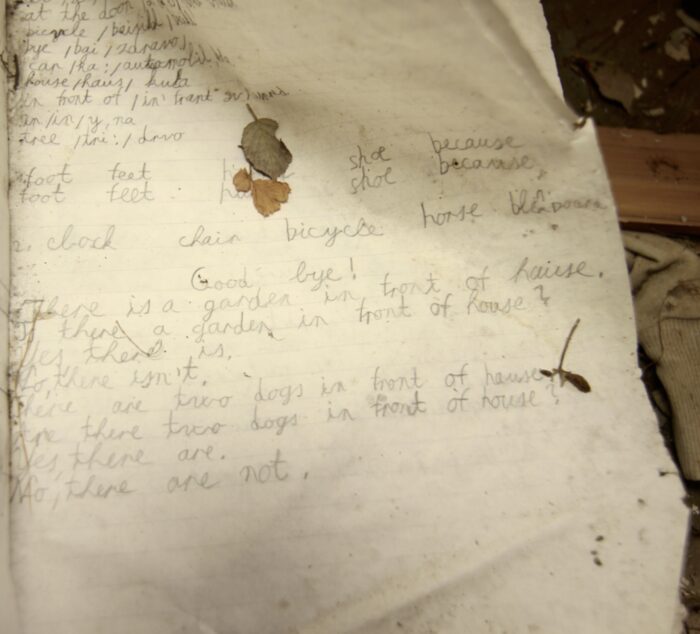
There is a garden in front of house.
Is there a garden in front of house?
Yes, there is.
No, there isn’t.
There are two dogs in front of house.
Are there two dogs in front of house?
Yes, there are.
No, there are not.
About the Author
Nevena Mrdjenovic is a theorist and designer with expertise in scenography and spatial design. Her creative work is primarily concerned with performative and poetic capacities of space - and is inspired by the concepts of memory, personal and collective identity, and entwined relationships between people and space. In her recently completed doctoral research, Nevena dealt with domestic spaces charged with mental experiences and destroyed homes as physical manifestations of interrupted identities. Situated within the field of scenography, her research practice involves both theoretical and historical contextualization. Site visits inform her physical and conceptual investigations of the aftermath of ethnic conflicts, which she represents through live actions and direct experiences. Nevena has previously worked across theatre, film, installation art, and pedagogy in Australia and Europe.
It is late summer here in Sydney. I am at home. This notion of being at home is a complex experience. This complexity has, once again, been amplified.I am scrolling through my feed, switching between apps, routinely. I consciously avoid questioning how much time I have spent doing this recently, looking at images on screens of different sizes.As I sit here, still tense and racing from the uncanny spatial experience of the ongoing global pandemic, another spatial phenomenon is emerging – and is taking over my feed.I am seeing images of destruction.This is a familiar topic.I am switched on.Kitchens, bedrooms, living rooms… the most intimate sites of one’s existence.I scroll through them: violated, bombed, destroyed.Another new war has started.Yet, I note a phenomenon particular to this new war: these images flood social media. Shared and liked in the name of protest and support for the victims.Domestic space is inscribed with political, cultural, and ideological connotations through its past and present inhabitation. Hence, in the time of conflict – it becomes a target.In all these images I see, I note an ominous resemblance to the scenes of destruction in our country… the one that no longer exists. The scars are surfacing.*A friend once told me about her grandmother, left behind in a small town in Banija, a region in the former Yugoslavia, now the Republic of Croatia. At the time of the Croatian army’s Operation Storm, in 1995, her grandmother had stayed behind when her immediate family members escaped the town. My friend’s grandmother had planned on leaving with her neighbors. She never did. They never saw her again.Actually, they did see her once more….Almost a year after the war, a few weeks before my friend was to emigrate to Australia, she was with her brother in their shared bedroom, in her family’s temporary accommodation in Belgrade. A political TV show was on RTS (Radio Television of Serbia).They were very common through the 90s and were a background noise in every household in the region.It became the focus in my friend’s room when it started screening low res footage of her hometown at the time of the clashes: suddenly there was her grandmother, standing again outside her house’s front gate.This was the last time they saw her alive.She went missing, was never buried by the family.*A house gives a person their place in the world. It satisfies a need to be situated, to have a shelter – to be protected. One experiences a sense of belonging by understanding a house and by identifying with it on physical and psychological levels. Interior space allows us to move inside, to hold the power to allow or to refuse others in our private space. That is, we hold authority over the unfamiliar.This note I give you is from one such house.It stands here as a fragile metaphor of an interrupted identity: one from our country.A note from a country that no longer exists, written in a wobbly child’s handwriting exposing vulnerability in the process of learning a new language.
About the Author
Nevena Mrdjenovic is a theorist and designer with expertise in scenography and spatial design. Her creative work is primarily concerned with performative and poetic capacities of space - and is inspired by the concepts of memory, personal and collective identity, and entwined relationships between people and space. In her recently completed doctoral research, Nevena dealt with domestic spaces charged with mental experiences and destroyed homes as physical manifestations of interrupted identities. Situated within the field of scenography, her research practice involves both theoretical and historical contextualization. Site visits inform her physical and conceptual investigations of the aftermath of ethnic conflicts, which she represents through live actions and direct experiences. Nevena has previously worked across theatre, film, installation art, and pedagogy in Australia and Europe.